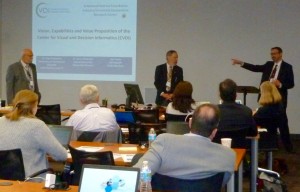|
CHAPEL HILL, NC, January 11, 2016 – The Texas Advanced Computing Center (TACC), a facility that provides scientists with some of the world’s most powerful computing resources to enable discoveries, is the latest organization to join the iRODS Partner Program, the iRODS Consortium announced today. Read more |
iRODS Consortium welcomes Texas Advanced Computing Center to Partner Program
iRODS helps astronomers take control of massive survey data
CHAPEL HILL, NC – An international research team studying many of the tough questions in astronomy, including the evolution of galaxies and the nature of dark matter, now have a way to query their massive data sets, store and retrieve data and corresponding metadata, and transport files and images.
By partnering with data specialists at UNC-Chapel Hill’s Renaissance Computing Institute (RENCI) who develop the integrated Rule-Oriented Data System (iRODS) researchers and students now have online databases for two large astronomical data sets: the REsolved Spectroscopy of a Local VolumE (RESOLVE) survey and the Environmental COntext (ECO) catalog. Read more
RENCI brings business and UNC researchers together for NSF-funded workshop
 Carolina researchers, representatives of area
Carolina researchers, representatives of area
businesses, and program officers with the National Science Foundation met Dec. 2 and 3 at RENCI to discuss collaborative research opportunities and partnerships aimed at translating academic research into competitive value for business. The workshop focused on establishing a new research site at Carolina of an NSF-funded Industry/University Cooperative Research Center (I/UCRC) called the Center for Visual and Decision Informatics (CDVI). Based at the University of Louisiana at Lafayette, CDVI already has research sites at Drexel University in Philadelphia and Tampere University of Technology in Finland.
iRODS Consortium welcomes NICS at University of Tennessee as newest member at SC15
Consortium membership doubles since last Supercomputing Conference.
AUSTIN, Texas, Nov. 18, 2015 – The National Institute of Computational Sciences (NICS) at the University of Tennessee today became the 13th member of the iRODS Consortium, the membership-based foundation organized to sustain the integrated Rule-Oriented Data System (iRODS) as free open source data management software.
The newest consortium member was announced in the RENCI booth (#181) on the SC15 show floor at the Austin Convention Center.
Software Defined Networking gives BEN a boost
 Breakable Experimental Network (BEN) is now faster and SDN-enabled
Breakable Experimental Network (BEN) is now faster and SDN-enabled
CHAPEL HILL, NC, November 10, 2015 – A collaboration between researchers at RENCI and the University of Houston means that RENCI’s Breakable Experimental Network (BEN) will be faster and easier to use for scientists with data intensive research problems to solve.
ExoGENI featured in SCinet Network Research Exhibition demos
 AUSTIN, TEXAS – Each year the SC conference, the annual gathering of industry and research experts in high performance computing, networking, storage and analysis, sets up one of the most powerful and advanced networks in the world: SCinet.
AUSTIN, TEXAS – Each year the SC conference, the annual gathering of industry and research experts in high performance computing, networking, storage and analysis, sets up one of the most powerful and advanced networks in the world: SCinet.
UNC-Chapel Hill’s RENCI and Georgia Tech to Lead Major Effort that Applies Big Data Solutions to Challenges Faced in North Carolina and the South
Buried in troves of data that scientists have gathered, but not yet analyzed, could be key insights to improving health care disparities, coastal hazards, and urban planning in the southern United States.
(Chapel Hill, N.C. – Nov. 2, 2015) — The University of North Carolina’s Renaissance Computing Institute (RENCI) and Georgia Institute of Technology will co-direct a new, national effort that is unprecedented in scope to develop a big data innovation hub serving 16 southern states and the District of Columbia. The hub will have dual locations in Atlanta and Chapel Hill, with co-executive directors who will be accountable to hub partners.
New study suggests hallucinations, alone, do not predict onset of schizophrenia
An analysis of psychological symptoms aims to refine diagnostic criteria for teens at high risk of developing the brain disorder that affects millions of people worldwide.
CHAPEL HILL, NC – Despite decades of study, schizophrenia has remained stubbornly difficult to diagnose in its earliest, prodromal stage. A new analysis led by researchers at the UNC School of Medicine and Renaissance Computing Institute identifies illogical thoughts as most predictive of schizophrenia risk. Surprisingly, perceptual disturbances, the forerunners of hallucinations, are not predictive, even though full-blown hallucinations are common features of schizophrenia. The results were published online today in the journal Schizophrenia Research. Read more


